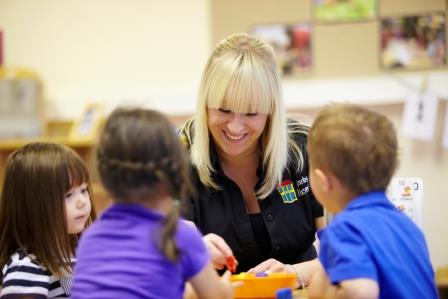Over the past two decades there has been substantial political interest and expansion of Early Childhood Education and Care (ECEC) services. Whether this be private nurseries, the voluntary sector or the maintained sector, such as schools and children’s centres. From September 2017, the entitlement to funded provision, introduced in the Childcare Act 2016, will rise to 30 hours for the majority of children. A missing discussion in many of these recent developments though is on quality of childcare workers. Recently an LSE report suggested that staff qualifications and quality ratings from Ofsted are not a good predictor of children’s attainment. So, what does this mean for practitioners and children?
The term childcare worker is politicised and in many ways not clear. It can cover those with little or no previous experience of working with children, those with a relevant level three qualification providing Early Educator Status, degree qualifications, Early Years Teacher Status (EYTS) and qualified teacher status (QTS). A focus in England has been on creating an early year’s sector that is ‘graduate led’. This is often referred to as an important ambition, however this needs to be qualified. In other countries around the world the majority of childcare workers are graduate. For example, New Zealand achieve around 75% and Sweden 50%. In contrast, England has around 85% of workers have a level three qualification. The government have signalled a desire to increase the number of graduates but there is no expectation of there been graduates in every setting.
So why do graduates matter?
Over the past two decades there has been a substantial increase in early childhood research. The Lancet has had three series focused on early childhood. The most recent, emphasises the importance of providing holistic services that support cognitive, psychological and physical development and support parents in their role in providing this for children. This is particularly important for children from 0-3. To achieve this requires practitioners to be nurturing and responsive in their interactions with children. In numerous research reports the EPPSE study, which followed a large cohort of children from their early years and through primary and secondary education, this was a central finding. The role of practitioners in supporting development, promoting curiosity and engaging young children in shared sustained thinking is key. To achieve this practitioners need to have an intellectual curiosity to engage with this evidence, support colleagues to reflect on their practice and implement practices that enable each child to achieve their potential and lay the foundations for social interaction, purposeful participation and holistic development.
More recently evidence from the Study of Early Education and Development (SEED) project has emphasised the importance of supporting children’s personal, social and emotional development and early language development and communication. These outcomes, which are integral to later achievement and working cooperatively with others, may not be readily measured from national teacher assessments at age 7. To achieve positive outcomes for children is complex and varied: it requires a focus on one-to-one work with children; effective curriculum planning to provide for individual children; good management and leadership and effective transition to support the transition to school. These are complex areas and this emphasises the need for graduates as a central part of the workforce, rather than a graduate led workforce. This supports and builds on much of the research from the EPPSE project. The study identified the positive impact of pre-school on children’s development and the role of well qualified practitioners.
Considering the evidence, the LSE study does raise valid questions about how a graduate contributes to the outcomes for children and the place of OFSTED in accessing quality. These are important findings and certainly warrant further investigation. However, this raises two important questions: how much can be expected from one graduate in a setting (or possibly one graduate supporting a number of settings) and how can this evidence be evaluated alongside the other available evidence, which has accumulated over the past two decades? On balance, there is still overwhelming evidence that supports the need for a well qualified workforce. European evidence also highlights a consistent association between staff qualifications/training and later school performance.
So, what is the missing link? Well perhaps that is a misleading question, as there are clearly many links. Given the broad evidence base, including the recent LSE data, what is highlighted are the complex variables that contribute to children’s development. Considering this, how realistic is it to expect one graduate to make a significant difference to many children? Perhaps therefore what this shows is the importance of aiming not for a graduate led workforce but being aspirational for all children and aiming for a graduate workforce, where graduates make up a sizable number of practitioners in every setting.
Sally Pearse is Head of Early Years Education (0-5) in the Department of Teacher Education
Damien Fitzgerald is Head of Children and Childhood in the Department of Education, Childhood

Leave a Reply